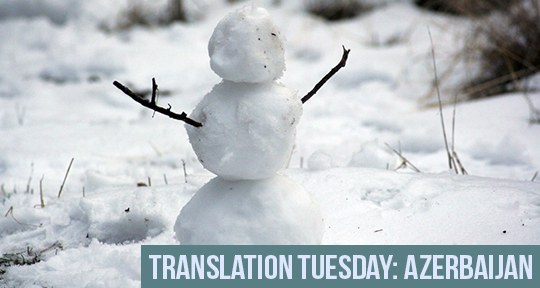For this week’s Translation Tuesday, a disabled youth’s love of football is hindered by his supposed friends in Musa Efendi’s short story “Gogol.” Though our narrator attempts to convince us (or perhaps himself) of his empathy for his friend Gogol, it’s not long before the petty worries of children mirror the cruel pragmatism of the adult world, all at the expense of their friend’s wishes. Through deceptively simple prose, we’re taken through a string of childhood vignettes chronicling the titular character’s ostracization. The narrator’s excuses, deflected upon the reader (“You would do the same thing, too”) segues into a haunting and almost surreal final image, a scene tinged by the narrator’s remorse and subdued sense of awe.
“Turtles can fly.”
–Bahman Ghobadi
I do not like Balzac-style narratives; I do want to know a lot, yet I never dreamed of seeing everything. So I choose to talk about the near side of the Moon.
*
We talked about this with the guys during the nights before the actual play. Despite the name of the game, hands play an important role in football; it is the hands that help you speed up when you are running. It is the hands that help you to keep your rival away when you have the ball. It is the hands that help the goalkeeper to not let the ball pass through the door. In football, you get penalized because of a hand, but you can’t play without it either. Elchin was the one who told us all this. This was the reason we didn’t let Gogol play and assigned him as commentator of the game instead. We called him Gogol because while commentating the game, he used to get excited when a goal was scored and would make a noise like this: Go-go-go-gooooal!
He wasn’t stammering. It is just that he didn’t have hands. Try to understand his situation by this single explanation—he couldn’t hug anyone.
*
Our yard was surrounded by the neighborhood of strong football teams. There was Boka’s team on the opposite street (I don’t remember the name of it); they used to play very well. Nemeczek, Csónakos played in his team as well. Timur and his team were another bunch of strong players. So we didn’t have a chance to actually let Gogol join us in the game. You would do the same thing, too; for us, our games were more like training. But it would be waste of time to try him out by giving him a chance to play. True, his loss was greater than ours, but it is not worth sacrificing or compromising in such matters. Grown-ups do this, too—they prefer to save time and money rather than noticing other people’s losses. Necessity of life—my father would say.
*
That day we played with Gogol’s ball since it was snowing and it was only him who had a red ball. That day it snowed till night. Gogol didn’t go home, he stayed in the field. We had lost the game.
*
You can see the field from our window; I watched him for a while. He stood at one spot looking up the sky. He didn’t move at all. I thought he would go home later. I went away from the window. It didn’t stop snowing. When I walked up to the window again, I saw a snowman at the place where Gogol was standing. It wasn’t dark yet. The Sun was setting. A middle-aged man came around. He had a mustache, and also small beard under his lower lip. His hair covered his ear (maybe he had a cap on, it just looked like hair to me from distance). He was wearing a weird overcoat.
He approached the snowman and gathered two branches from the tree on the side. He stuck them on the right and left sides of the snowman. He did have hands now.
I was watching him from behind. The Sun was setting and it looked as if he were hugging the Sun with his newly gained stick hands.
Written and translated from the Azerbaijani by Musa Effendi
After graduating from the Azerbaijan State University of Economics in Baku, Musa Effendi studied at Boğaziçi University in Istanbul and London School of Economics (LSE) in London. At the age of twenty, his short story, “Taken Away,” won a prize in a writing competition judged by the online audience of RFE’s Azerbaijani Service, Radio Azadliq and the jury consisted of writers and editors; he was also winner of Nesimi Prize that same year. He now runs a creative agency, Agilli Nagillar (Smart fairy tales), writing short stories and planning to complete a new film script. He’s also a full-time marketing consultant of TEAS Press Publishing House and Libraff Book Stores, and works as a part-time adjunct instructor of marketing courses at UNEC, where he received his bachelor’s degree. His first script, “Thus Spoke Zarathustra” was made into a short film that was shown at Cannes Film Festival’s “Short Film Corner.”
*****
Read more on the Asymptote blog:

